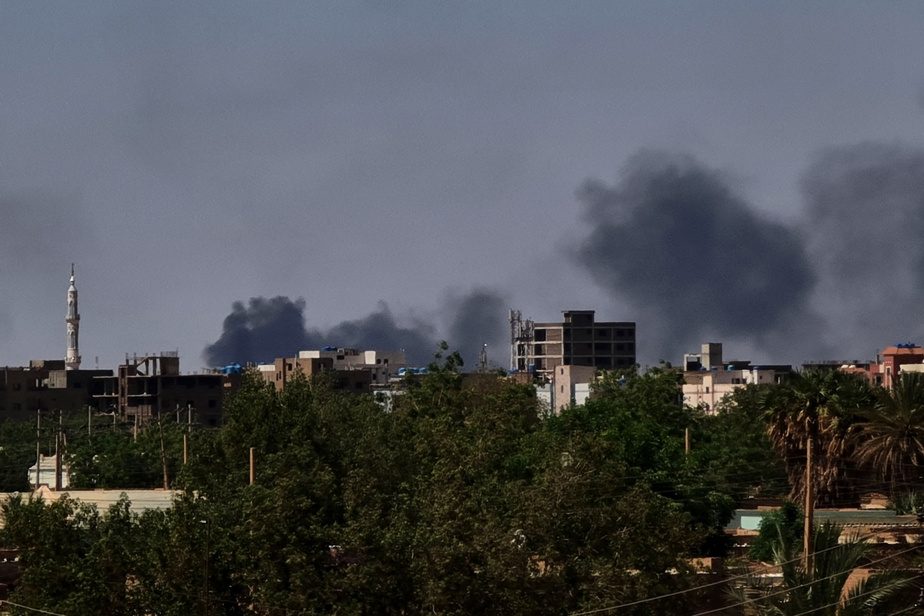(Khartoum) Explosions and gunshots rang out Thursday in Khartoum, the twentieth day of fierce fighting between the army and the paramilitaries who are vying for power in Sudan, risking dragging the region into a crisis.
Despite the announcement of a new truce until May 11, “ clashes with all kinds of weapons and explosions ” are shaking Khartoum, residents reported to AFP.
Like many others in the capital of more than five million inhabitants, they now live only to the rhythm of the bombardments. Holed up in their homes to avoid stray bullets, they are often deprived of water and electricity, also facing money and food problems, all in the overwhelming heat.
In the surrounding villages, “ fuel prices have risen, there is no cash, no online payment, no electricity”, laments Ahmed Hachem, a vegetable seller.
Since April 15, the war between the army of General Abdel Fattah al-Burhane and the paramilitaries of the Rapid Support Forces (FSR), of General Mohamed Hamdane Daglo, has caused around 700 deaths, according to the NGO ACLED which lists the victims of conflict.
The fighting also left more than 5,000 wounded. At least 335,000 people have been displaced and 115,000 forced into exile, according to the UN. To help them, 402 million euros are needed, the UN pleaded on Thursday.
The day the war broke out, the two generals, allies for the putsch of 2021, were to discuss with the UN and international mediators the integration of the FSR into the army, a sine qua non for a return to transition. towards a civilian government and therefore the resumption of international aid, suspended in response to the coup.
“We can say that we have not succeeded in preventing” the war which took the UN “by surprise”, acknowledged Wednesday its Secretary General, Antonio Guterres.
“With every additional minute of war, people die or are thrown into the streets, society is falling apart and the state is weakening and breaking down a little more”, lamented Khalid Omar Youssef, a former Sudanese minister, civilian sacked during the putsch.
In the violence-spared coastal city of Port Sudan, UN emergency relief coordinator Martin Griffiths tries to organize the replenishment of stocks after mass looting in the country of 45 million inhabitants, where one in three already depended on humanitarian aid before the war.
The UN High Commissioner for Human Rights, Volker Türk, describes the chaos in Khartoum: “an air force raid on a hospital”, the RSF “launching attacks in areas densely populated cities ” …
In Darfur (west), where civilians were armed to participate in clashes mixing military, paramilitary and tribal or rebel fighters, according to the UN, the NGO Norwegian Refugee Council (NRC) recounts the desolation: “ there was at least 191 dead, dozens of homes burned, thousands displaced and NRC offices were looted”.
The Sudanese Foreign Ministry also accused the FSRs of attacking evacuated chancelleries: “ the embassies of India and Korea, the Saudi cultural office, the residence of Swiss diplomats and a Turkish consular section ”.
South Sudan, a historic mediator, announced a truce “from May 4 to 11”. When it came into force, the army and the FSR accused each other of violating it.
As diplomatic channels multiply in Africa and the Middle East, the army pleaded for “ African solutions to the continent’s problems ”.
She also hailed the US-Saudi mediations. On Sunday, Arab foreign ministers will meet to discuss the “Sudanese dossier”, in which they support different camps, a senior diplomat told AFP.
General Burhane’s camp has pledged to “appoint an envoy to negotiate a truce” with the rival camp, under the aegis of “the presidents of South Sudan, Kenya and Djibouti”, in a country that has yet to be determined.
In Sudan, the exodus of inhabitants continues and foreigners continue to be evacuated by the hundreds, mainly via Port-Sudan, on the Red Sea.
At the Egyptian border in the north, “more than 50,000 people including 47,000 Sudanese had crossed on May 3”, according to the UN, which was authorized on Thursday to deploy on the Egyptian side.
Mr. Guterres considered it “ absolutely essential ” that the crisis does not extend beyond borders.

